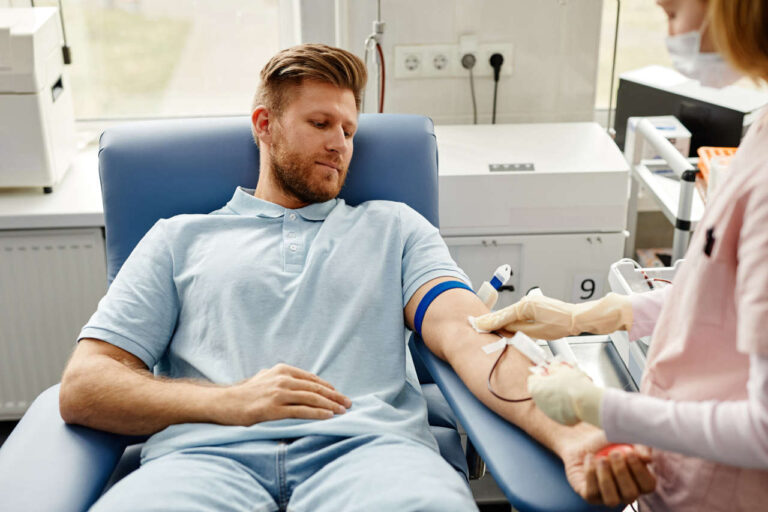
IVIG, or intravenous immunoglobulin, is a parenteral drug treatment containing healthy antibodies obtained from donors. It possesses immunomodulatory and anti-inflammatory effects, which help treat neuropathy, a condition that causes nerve tingling, pain, and numbness.
Get IVIG Copay Assistance
Speak to a SpecialistIVIG is used to treat several nerve and muscle disorders with its autoimmune and inflammatory components. Disorders that are treated include Guillain-Barré syndrome (GBS), myasthenia gravis, chronic Inflammatory demyelinating polyneuropathy (CIDP), dermatomyositis, and others.
IVIG contains a variety of antibodies that help suppress harmful autoantibodies and modulate the immune system to relieve nerve damage. In this article, we will discuss details about IVIG treatments for neuropathy. We will also cover the symptoms and causes of neuropathy, the side effects of IVIG, and more. So, let’s get started.
What Is IVIG and How Does It Work?
Intravenous immunoglobulin (IVIG) is a drug therapy that contains pooled antibodies, which are given through the veins of patients. The various antibodies in IVIG modulate the immune system and stimulate it to fight against infections, inflammatory conditions, and autoimmune disorders.
The dose and duration of IVIG treatment depend on individual patient needs and health conditions. The typical starting dose of IVIG is 400 to 600 mg/kg of body weight every 3 to 4 weeks.
What Is Neuropathy?
Neuropathy refers to nerve damage, which results in weakness, tingling sensation, numbness, and pain in certain parts of the body, depending on the type of neuropathy occurring.
The common types of neuropathy include peripheral neuropathy, which occurs in nerves located in the body’s extremities, like the hands or feet. Other common types include diabetic neuropathy, nerve damage caused by long-term diabetes or high blood sugar, or autonomic neuropathy that occurs in nerves controlling automatic body functions.
IVIG Indications for Neuropathy
IVIG is commonly given to patients in whom neuropathy is associated with autoimmune diseases, like chronic inflammatory demyelinating polyneuropathy or Guillain-Barré syndrome.
For example, when autoimmune disorders damage the nerves, it results in inflammation and pain. IVIG is administered to dampen the immune response against attacking nerves.
Hence, IVIG may not be indicated in all patients with neuropathy as it is primarily dependent on the cause of the disorder. For example, if neuropathy occurs due to diabetes, the ideal approach would be to control blood sugar levels with medications, diet, and exercise.
Anticonvulsant medications, like pregabalin, may also be used to help ease neuropathic pain by blocking abnormal electrical activity in the brain. If neuropathy occurs due to immune disorders or deficiencies, IVIG may be an effective treatment option.
Ask About IVIG Home Infusion
IVIG Treatments for Neuropathy: How It Works
IVIG helps treat neuropathy by boosting the immune response and replenishing it with a significant amount of healthy antibodies that aid in reducing nerve pain. The main actions of IVIG for treating neuropathy are its immunomodulatory and anti-inflammatory effects.
The exact mechanism is unknown, but it is believed that IVIG helps treat neuropathy by the following mechanisms and effects:
Immunomodulation
Neuropathy may occur when the immune system mistakenly attacks the nerves or muscles due to an autoimmune disease. The healthy antibodies present in IVIG stop the immune response and prevent it from damaging nerves.
Anti-Inflammatory Effects
In patients with neuropathy, neuropathic pain is a common symptom. In this condition, pro-inflammatory cytokines (interleukin-1 and TNF-α) are overexpressed or excessively produced.
The anti-inflammatory effects of IVIG suppress the signals, which in turn help reduce inflammation and pain in the nerves.
Neutralization of Autoantibodies
By infusing antibodies into the patient’s immune system, IVIG aids in counteracting and mitigating the impact of detrimental autoantibodies that can potentially attack muscle or nerve receptors. This action helps prevent further nerve damage.
Side Effects of IVIG
IVIG has the potential to cause some side effects, including:
- Low-grade fever
- Headaches
- Infusion-related side effects, like mild redness, pain, or swelling at the site of injection.













